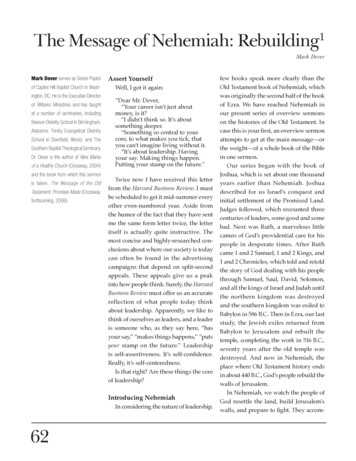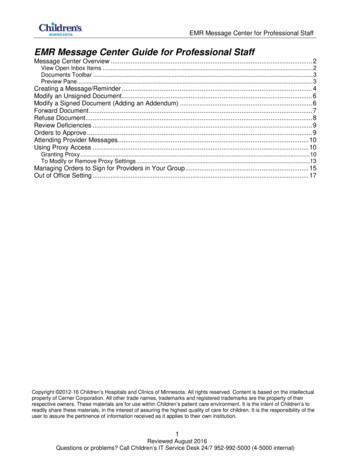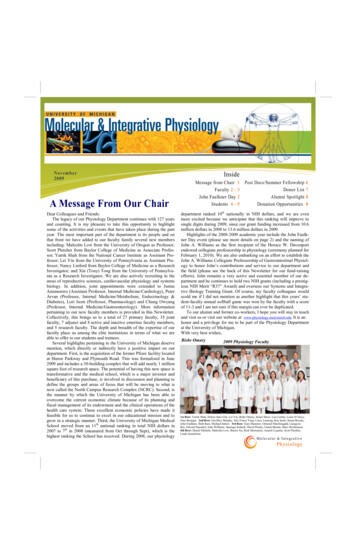
Transcription
The Message of Nehemiah: Rebuilding1Mark DeverMark Dever serves as Senior Pastorof Capitol Hill Baptist Church in Washington, DC. He is the Executive Directorof 9Marks Ministries and has taughtat a number of seminaries, includingBeeson Divinity School in Birmingham,Alabama; Trinity Evangelical DivinitySchool in Deerfield, Illinois; and TheSouthern Baptist Theological Seminary.Dr. Dever is the author of Nine Marksof a Healthy Church (Crossway, 2004)and the book from which this sermonis taken, The Message of the OldTestament: Promises Made (Crossway,forthcoming, 2006).Assert YourselfWell, I got it again:“Dear Mr. Dever,“Your career isn’t just aboutmoney, is it?“I didn’t think so. It’s aboutsomething deeper.“Something so central to yourcore, to what makes you tick, thatyou can’t imagine living without it.“It’s about leadership. Havingyour say. Making things happen.Putting your stamp on the future.”Twice now I have received this letterfrom the Harvard Business Review. I mustbe scheduled to get it mid-summer everyother even-numbered year. Aside fromthe humor of the fact that they have sentme the same form letter twice, the letteritself is actually quite instructive. Themost concise and highly-researched conclusions about where our society is todaycan often be found in the advertisingcampaigns that depend on split-secondappeals. These appeals give us a peakinto how people think. Surely, the HarvardBusiness Review must offer us an accuratereflection of what people today thinkabout leadership. Apparently, we like tothink of ourselves as leaders, and a leaderis someone who, as they say here, “hasyour say,” “makes things happens,” “putsyour stamp on the future.” Leadershipis self-assertiveness. It’s self-confidence.Really, it’s self-centeredness.Is that right? Are these things the coreof leadership?Introducing NehemiahIn considering the nature of leadership,62few books speak more clearly than theOld Testament book of Nehemiah, whichwas originally the second half of the bookof Ezra. We have reached Nehemiah inour present series of overview sermonson the histories of the Old Testament. Incase this is your first, an overview sermonattempts to get at the main message—orthe weight—of a whole book of the Biblein one sermon.Our series began with the book ofJoshua, which is set about one thousandyears earlier than Nehemiah. Joshuadescribed for us Israel’s conquest andinitial settlement of the Promised Land.Judges followed, which recounted threecenturies of leaders, some good and somebad. Next was Ruth, a marvelous littlecameo of God’s providential care for hispeople in desperate times. After Ruthcame 1 and 2 Samuel, 1 and 2 Kings, and1 and 2 Chronicles, which told and retoldthe story of God dealing with his peoplethrough Samuel, Saul, David, Solomon,and all the kings of Israel and Judah untilthe northern kingdom was destroyedand the southern kingdom was exiled toBabylon in 586 B.C. Then in Ezra, our laststudy, the Jewish exiles returned fromBabylon to Jerusalem and rebuilt thetemple, completing the work in 516 B.C.,seventy years after the old temple wasdestroyed. And now in Nehemiah, theplace where Old Testament history endsin about 440 B.C., God’s people rebuild thewalls of Jerusalem.In Nehemiah, we watch the people ofGod resettle the land, build Jerusalem’swalls, and prepare to fight. They accom-
plish much, and so many of their namesare prominently placed in the lists scattered throughout the book. In the foreground of the unfolding story, however,are the leaders: The priests who work inthe temple and teach God’s law—chiefamong whom is Ezra—and the governorhimself, Nehemiah.As we look at the portraits presented inthe book of Nehemiah and Ezra, we wantto ask an always crucial question: Whatkind of leadership does the Bible presentas exemplary? Even more concisely, whatis godly leadership? This question willhelp guide us through the book of Nehemiah, where we will note eight aspects ofgodly leadership. I pray that through thistime, God will give you more understanding of what he calls you to be, as well ashow he calls you to use the time, influence,and opportunities that he gives to you.(1) A Godly Leader PraysFirst, we see that a godly leader prays.The book begins in Babylon with Nehemiah getting some bad news. Nehemiahrecounts the story:Hanani, one of my brothers, camefrom Judah with some other men,and I questioned them about theJewish remnant that survived theexile, and also about Jerusalem.They said to me, “Those whosurvived the exile and are back inthe province are in great troubleand disgrace. The wall of Jerusalemis broken down, and its gates havebeen burned with fire.”When I heard these things, I satdown and wept. For some days Imourned and fasted and prayedbefore the God of heaven (Neh1:2-4).2We do not think much about city wallsthese days, and so the news Nehemiahhears about the sad state of Jerusalem’swalls may not seem like a big deal toyou. But actually, a city’s walls werearguably more important than its army.Without walls, a city would be at themercy of whatever band of marauderscame through. It could not control itself.That’s why we can make sense of theproverb that says, “Like a city whosewalls are broken down is a man who lacksself-control” (Prov 25:28). Such a man isdestroyed by any passing temptation oroutside influence.Jerusalem was in such a state. Nehemiah hears about it, is moved, and immediately turns to prayer. His first act is togo to God, who is sovereign over all theempires that might descend upon Jerusalem. He prays,“O LORD, God of heaven, the greatand awesome God, who keeps hiscovenant of love with those wholove him and obey his commands,let your ear be attentive and youreyes open to hear the prayer yourservant is praying before you dayand night for your servants, thepeople of Israel. I confess the sinswe Israelites, including myself andmy father’s house, have committedagainst you. We have acted verywickedly toward you. We have notobeyed the commands, decrees andlaws you gave your servant Moses.Remember the instruction yougave your servant Moses, saying, ‘Ifyou are unfaithful, I will scatter youamong the nations, but if you returnto me and obey my commands, theneven if your exiled people are at thefarthest horizon, I will gather themfrom there and bring them to theplace I have chosen as a dwellingfor my Name.’They are your servants and yourpeople, whom you redeemed byyour great strength and your mightyhand. O Lord, let your ear be attentive to the prayer of this your servantand to the prayer of your servantswho delight in revering your name.Give your servant success today bygranting him favor in the presenceof this man.” I was cupbearer to theking (1:5-11).63
It is a beautiful, compact prayer, beginning with praise, moving to confession,then citing God’s promises back to God.He reminds God of how his name is tiedup with his people’s name, and then asksGod to move the king of Persia’s heart.Adoration, confession, scriptural promise,honoring of God, the request itself—thisis not a bad model for a prayer! If you area leader in any capacity and you wantto know how to pray, Nehemiah’s briefprayer in chapter 1 is a good model.Not only was Nehemiah moved toprayer in chapter 1, we find him prayingthroughout the book. In chapter 2, heshoots up an “arrow prayer,” as some callit, when King Artaxerxes asks him a question and he wants to answer well: “Theking said to me, ‘What is it you want?’Then I prayed to the God of heaven, andI answered the king, ‘If it pleases the king. . .” (2:4-5a). You can be sure that Nehemiah did not open his mouth and utter along pastoral prayer like we do in churchon Sunday mornings. I assume he prayedsilently and briefly. You don’t want theking to think you are not paying attention!And these types of prayers seemed to typify Nehemiah’s life. He utters brief prayersto God over everything that concerns himthroughout the book: “remember me inmercy, O God; frustrate my enemies, OLord;” and so on.3I wonder how alone you feel whenyou receive bad news, or when you areenduring a time of tragedy. If you do notbelieve in the God of the Bible, I expectone of the loneliest feelings in the universemust be experienced when you hear aboutsomething of great magnitude—good orbad—and you feel an innate desire to talkto him. To say, “Thank you!” or “Why?”I have seen this happen so many times,and I believe you know what I am talking64about. Perhaps you just thought you weretalking to yourself. But I don’t think so. Ithink you were trying to talk to someoneelse, someone whom you don’t even know.And you can!Friend, God cares about us in ways noone else does. When God’s people werein Jerusalem and no one paid attention tothem, they were not ultimately at the disposal of their Persian overlords. By God’sprovidence, news came to Nehemiah inBabylon, and Nehemiah was sent! Godalone is finally sovereign, and he canalways be approached in prayer. That isan amazing thought! That this One whois sovereign over the universe is alwaysapproachable to us in prayer! Even thoseof you who meet with the president of theUnited States with some regularity maynot be able to talk with him at will. Butthose of us who know God through Christcan always speak with the One who holdsthe president’s heart in his hands. Thatis the privilege that you and I have inChrist—the privilege of prayer.My Christian friend, cultivate yourprayer life. Cultivate your desire to talkto him. What is your first response tochallenges? To bad news? For that matter,what is your first response to good news?What stirs up your heart? When you hearanything of significance, you shouldrespond in prayer. Especially if you wouldbe a leader of God’s people!For those of you who are leadersin the church, I hope you realize thatNehemiah should not encourage us topray for our nation’s armies so much asit pushes us to pray that God’s peoplewould be distinct from the surroundingworld. That’s ultimately why Nehemiahwas concerned about Jerusalem’s walls.Today, we don’t need to pray that Godwould erect a physical boundary between
his people and others; we need to praythat he would preserve the distinctionbetween the people he has redeemed andthe people who remain in darkness andrebellion. That is how the world will seethe light—through people like us, as welive new lives. And that is what we shouldpray for as leaders in the church, if wewould be godly leaders.(2) A Godly Leader ActsIf this book is anything, it is a bookof action, which brings us to the secondcharacteristic of a godly leader: a godlyleader acts.In large part, the book reads likeNehemiah’s own memoirs. By this I don’tmean his autobiography, which wouldbe a record of his own internal life. No,they’re memoirs because they recountgreat events and his own part in them.What emerges in these memoirs is a skillful political actor, whose concern for hisown people apparently coincided withthe desires of his king, Artaxerxes. It isArtaxerxes who commissions Nehemiahto go to Jerusalem:In the month of Nisan in the twentieth year of King Artaxerxes, whenwine was brought for him, I took thewine and gave it to the king. I hadnot been sad in his presence before;so the king asked me, “Why doesyour face look so sad when you arenot ill? This can be nothing but sadness of heart.”I was very much afraid, but I saidto the king, “May the king live forever! Why should my face not looksad when the city where my fathersare buried lies in ruins, and its gateshave been destroyed by fire?”The king said to me, “What is ityou want?”Then I prayed to the God ofheaven, and I answered the king,“If it pleases the king and if yourservant has found favor in his sight,let him send me to the city in Judahwhere my fathers are buried so thatI can rebuild it.”Then the king, with the queensitting beside him, asked me, “Howlong will your journey take, andwhen will you get back?” It pleasedthe king to send me; so I set a time(2:1-6).What an interesting account! Nehemiah is “very much afraid” of this absolute monarch’s power to deal with himsimply for looking sad in his presence,yet he continues with his plea despite hisfear. He prays, as we mentioned before,and he acts! He speaks to the king abouthis troubles! Nehemiah was a man ofaction. “And because the gracious handof my God was upon me,” he says, “theking granted my requests” (2:8b; cf. 2:18).Before you know it—the next verse, in fact(2:9)—Nehemiah is off with permissionletters from the king in hand.Upon arriving in Jerusalem, Nehemiahagain takes the initiative by setting out ona fact-finding mission:I set out during the night with afew men. I had not told anyonewhat my God had put in my heartto do for Jerusalem. There were nomounts with me except the one Iwas riding on.By night I went out through theValley Gate toward the Jackal Welland the Dung Gate, examiningthe walls of Jerusalem, which hadbeen broken down, and its gates,which had been destroyed by fire(2:12-13).Now, Nehemiah does not wrap up hiswork after collecting facts. He takes on thechallenge of caring for Jerusalem and, inchapter 3, leading the people to re-buildthe wall.And he does it skillfully! He dividesup the work between various groups ofpeople, giving many of them responsibility for the parts of the wall near theirown homes, so that they would have an65
obvious interest in it.4 Throughout chapter3, we find the people zealously repairingthe wall.By the end of chapter 6, the wall iscompleted, but Nehemiah continues tobe a man of action throughout the book.In chapter 7, he deals with the problemscreated by a city population that was toosmall. In chapter 12, he orchestrates thecelebrations for dedicating the completedwalls. By God’s providence, no significantpart of Jerusalem’s rehabilitation wasaccomplished apart from the activity ofthis one leader, Nehemiah! It is a striking story.Today, Christian, you and I do not needto act by physically separating ourselvesfrom others. God does not call Christiansto live in separate gated communities, orto build high walls around their churches.That is not how we apply Nehemiah’sefforts to ourselves. Rather, we want tobe identified as those who are ransomedby the death of Christ for as long as welive in this world. Christ has granted us anewness of life, and we want this changeto mark us out. After all, it is our newnessof life, more than any wall, that points theworld to him!Therefore, repentance and trust mustbe our chief actions. As we continuallyrepent of our sins and trust in him, thewonderful fruit of our newness becomesmore and more evident. So we mustencourage one another toward continualrepentance of the sins that make us looklike we still belong to this world.If that is how godly leaders must act,then pray that God would give the eldersof his church wisdom to act in ways thatbless this church, preserve the witness ofthe church, and protect God’s people frombeing dissolved into the world around. Soa godly leader acts.66(3) A Godly Leader Will FaceOppositionThird, a godly leader will face opposition. The first stirrings of oppositionemerge in chapter 2 when Nehemiahannounces his plans to return to Jerusalem (2:10, 19). But the opposition reallybegins to dominate the story in chapter4, after Nehemiah has led the people tobegin rebuilding the walls.When Sanballat heard that wewere rebuilding the wall, he becameangry and was greatly incensed. Heridiculed the Jews, and in the presence of his associates and the armyof Samaria, he said, “What are thosefeeble Jews doing? Will they restoretheir wall? Will they offer sacrifices?Will they finish in a day? Can theybring the stones back to life fromthose heaps of rubble—burned asthey are?”Tobiah the Ammonite, who was athis side, said, “What they are building—if even a fox climbed up on it,he would break down their wall ofstones!” (4:1-3).The rebuilding continues amidstmockery and opposition. But then thestakes rise:But when Sanballat, Tobiah, theArabs, the Ammonites and themen of Ashdod heard that therepairs to Jerusalem’s walls hadgone ahead and that the gaps werebeing closed, they were very angry.They all plotted together to comeand fight against Jerusalem and stirup trouble against it. But we prayedto our God and posted a guard dayand night to meet this threat.Meanwhile, the people in Judahsaid, “The strength of the laborersis giving out, and there is so muchrubble that we cannot rebuild thewall.”Also our enemies said, “Beforethey know it or see us, we will beright there among them and will killthem and put an end to the work.”Then the Jews who lived nearthem came and told us ten times
over, “Wherever you turn, they willattack us.”Therefore I stationed some of thepeople behind the lowest pointsof the wall at the exposed places,posting them by families, with theirswords, spears and bows. After Ilooked things over, I stood up andsaid to the nobles, the officials andthe rest of the people, “Don’t beafraid of them. Remember the Lord,who is great and awesome, and fightfor your brothers, your sons andyour daughters, your wives andyour homes.”When our enemies heard thatwe were aware of their plot andthat God had frustrated it, we allreturned to the wall, each to hisown work.From that day on, half of my mendid the work, while the other halfwere equipped with spears, shields,bows and armor. The officers postedthemselves behind all the people ofJudah who were building the wall.Those who carried materials didtheir work with one hand and helda weapon in the other, and each ofthe builders wore his sword at hisside as he worked (4:7-18a).When the opposition increases, Nehemiah prays and posts a guard. He bothinvokes God’s aid and acts. I hope yourealize there is nothing inconsistent aboutdoing these two things together. Whenhis fellow citizens become discouraged,likewise, he exhorts them not to fear thesepeople, to trust in the Lord, and, if needbe, to fight them.The opposition continues into chapter6, yet here the Jews’ opponents begin tofocus on slandering and intimidatingNehemiah himself. Nehemiah turns toGod in prayer, and God gives him thewisdom he needs to respond to this opposition (6:9-13).Let me add, facing opposition well isusually more complicated than peopleimagine. But this is what a leader does!Like Nehemiah, we must not let opposition drive us from God, but to him. Thereis nothing surprising about the fact thatNehemiah’s opponents try to intimidatehim personally. The adversary of God’speople will always go for the leaders.Discredit and manipulate the leaders, andthe flock will be disorganized, confused,and ineffectual.The wall is completed in fifty-two daysdespite the opposition (6:15)!Still, his adversaries do not rest. Nehemiah writes,Also, in those days the nobles ofJudah were sending many lettersto Tobiah, and replies from Tobiahkept coming to them. For many inJudah were under oath to him, sincehe was son-in-law to Shecaniah sonof Arah, and his son Jehohanan hadmarried the daughter of Meshullamson of Berekiah. Moreover, they keptreporting to me his good deeds andthen telling him what I said. AndTobiah sent letters to intimidate me(6:17-19).Tobiah continues insidiously to infiltrate the ranks of Nehemiah’s helpersand to sow opposition against him andhis policies. Thank God that he gave hispeople a leader as fearless as Nehemiah!How easy it would have been for Nehemiah to be deflected into doing whateverhe could to stop all the ill reports. Butfriend, that is never an option for thosewho aspire to leadership. Leaders willface opposition.I wonder if you think of yourself asfearless? Perhaps you laugh at that question and say, “No, of course not!” Ormaybe the question does not move youat all because you do. You think of yourself as fearless. Let me ask, when you arehaving a conversation with yourself, howimportant do you find other’s thoughtsof you to be? How much do you carewhat others think about you? Friend, theonly liberation we will ever find from a67
debilitating fear of man is a real, true,and correct fear of God. He is the Onewhose respect
at a number of seminaries, including Beeson Divinity School in Birmingham, Alabama; Trinity Evangelical Divinity School in Deerfield, Illinois; and The Southern Baptist Theological Seminary. Dr. Dever is the author of Nine Marks of a Healthy Church (Crossway, 2004) and the book from which this sermon is taken, The Message of the Old










